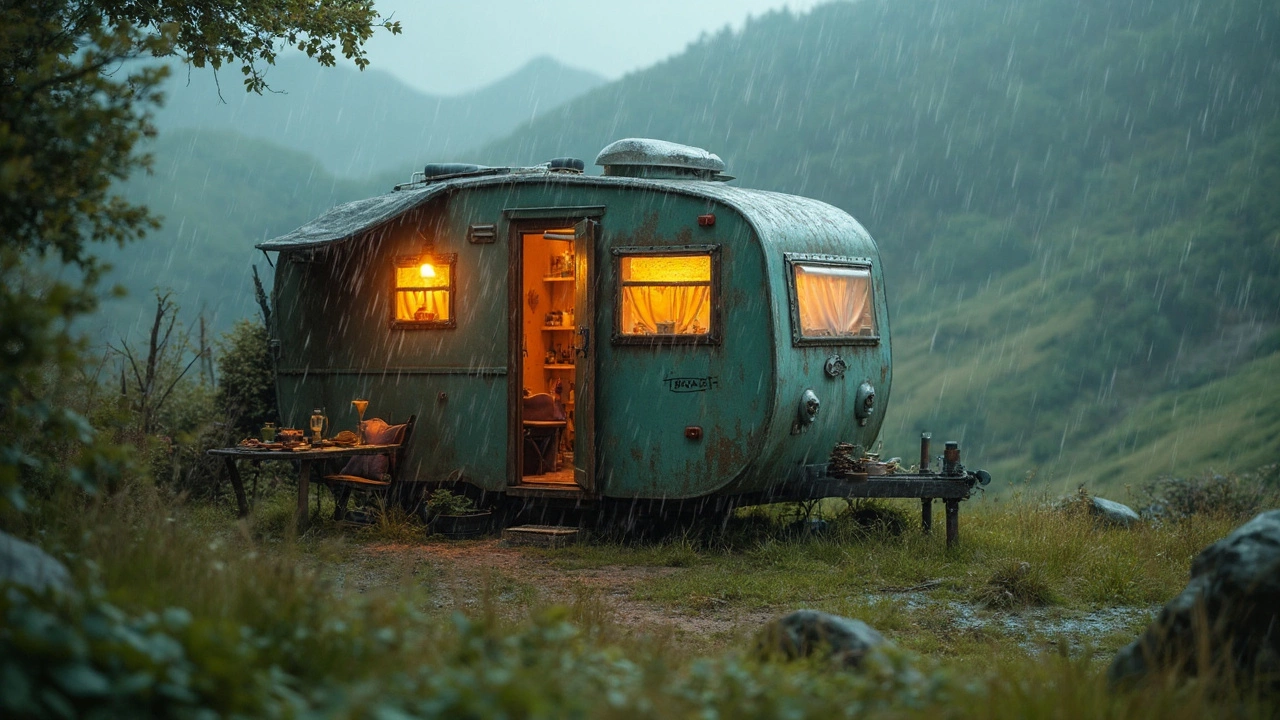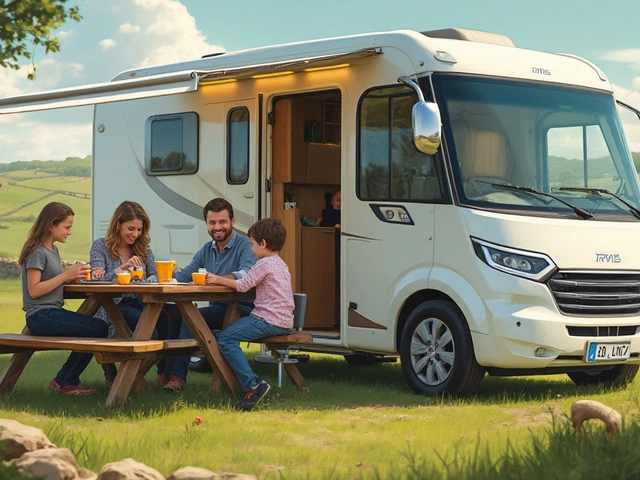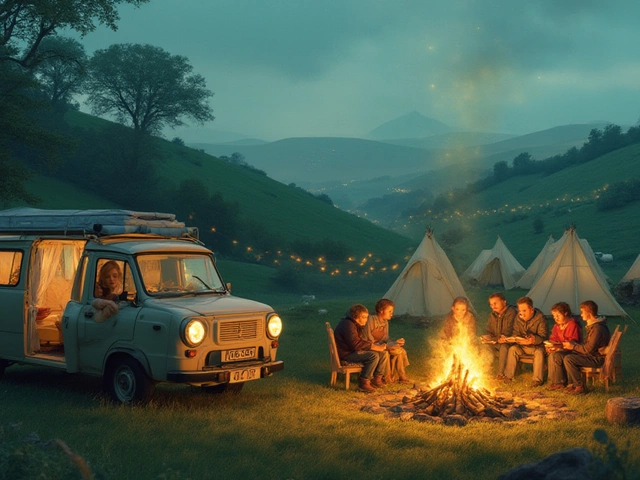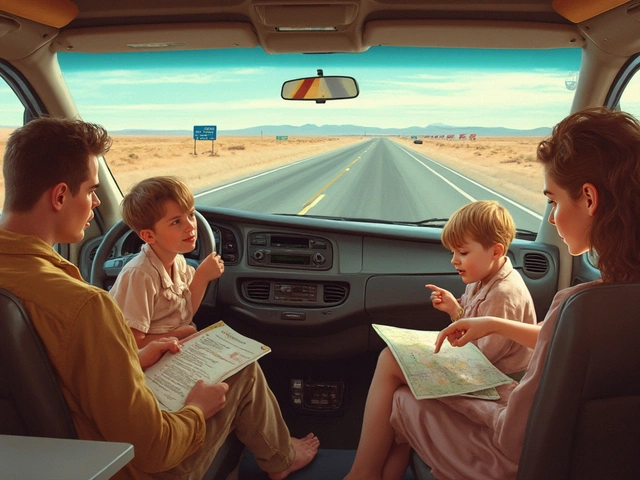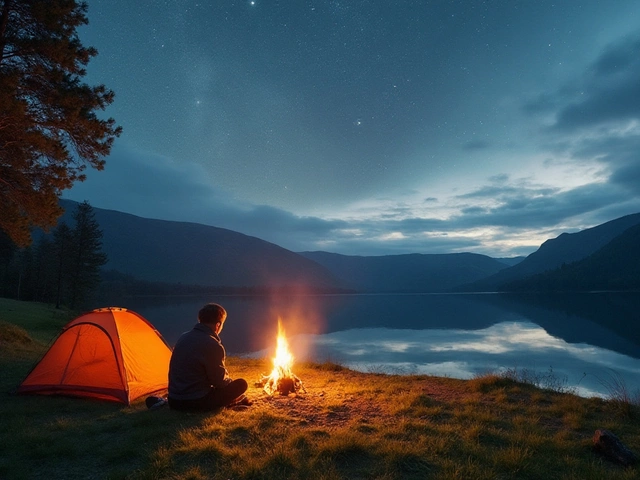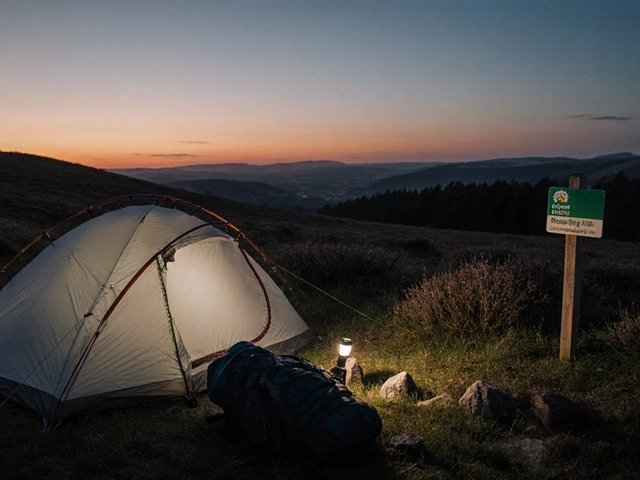Living in a caravan might sound like the ultimate escape, a way to break free from the constraints of traditional living. But, hold your horses—it's not all sunshine and rainbows. One of the first things people notice about caravans is the limited space. Picture squeezing your entire life into a tiny, mobile box. Sure, it forces you to declutter, but when your bedroom, kitchen, and living room are all crammed into one space, privacy takes a nosedive. If you're not a fan of close company, it might be a hard adjustment.
There's also the weather to think about. Caravans can get surprisingly hot in the Australian summer, while winters can feel pretty chilly. Insulation isn't always perfect, and the wind and rain can sometimes make you feel like you're on a boat instead of on land. Not exactly the relaxed vibe many dream of.
Then there's the maintenance. Caravans require constant upkeep—everything from minor repairs to major fixes. Things wear down quicker when you're moving around a lot. Toilets, water tanks, and electrical systems all need regular attention. And if something breaks, you're the one who has to solve the problem, unless you fancy hiring help at your own cost.
- Space and Privacy Limitations
- Weather and Environmental Impacts
- Maintenance and Wear and Tear
- Utility and Resource Management
- Financial Considerations
Space and Privacy Limitations
Living in a caravan often means saying goodbye to spacious rooms and hello to cozy quarters. If you've ever imagined fitting your life into a matchbox, this might be it. Most caravans average around 20 to 40 square meters, so you can't exactly throw a party for more than a couple of friends without feeling like sardines.
Why Space Matters
Space isn't just about physical room. It's also about mental and emotional wellbeing. A cluttered living area can easily lead to a cluttered mind. Most people aren't used to sharing such close quarters, especially if they cherish personal space. When your kitchen is literally an arm's length from where you sleep, it can be challenging to truly unwind.Privacy? What's That?
With space being so limited, privacy levels aren't exactly ideal. If you're living with someone else, you'll likely be in each other's paths all the time. Need some alone time? Good luck finding it without stepping outside, unless you're up for a walk or a seat by a campfire. This setup can be tricky for introverts or anyone who values a bit of solitude.Creative Solutions
But don't despair! There are ways to work around these limitations. Here's what some savvy caravan folks do:- Multi-purpose Furniture: Investing in foldable or multi-use furniture can really maximize your space.
- Organizational Hacks: Use vertical storage solutions. Hooks, shelves, and hanging organizers can turn those awkward nooks into prime storage spots.
- Outdoor Living: Using your outdoor area can provide much-needed extra space. Pop-up gazebos or deck chairs can extend your living zone.
- Communication is Key: If you're sharing the space, clear communication about time for socializing versus alone time helps reduce tension.
Adapting to caravan living isn't always easy, but with a bit of creativity and flexibility, you can make it work and even enjoy the cozy vibes.
Weather and Environmental Impacts
When it comes to living in a caravan, you definitely can't ignore what Mother Nature throws your way. The weather plays a big role in your daily life and can be quite the handful. Let's break it down, shall we?
Heat and Sun
Australia's sun is no joke. During the summer months, caravans can easily turn into ovens. The lack of proper insulation in many caravans means they tend to trap heat, making for some sweaty living conditions. A good step is investing in reflective covers or sunshades, which can help tremendously in keeping things cool.
Cold and Rain
On the flip side, winter chills and rainstorms are just as challenging. Caravans often struggle to keep the cold out, especially older models that might not have had updates. It’s advisable to weatherproof as much as you can. Adding thick curtains and portable heaters are often lifesavers during colder months.
The Wind Factor
Caravans, by nature, are lightweight, which means high winds can make things feel a bit rocky. It's not uncommon to feel like you're swaying during a strong breeze. Securing your caravan with stabilizers or parking strategically to reduce wind impact are good moves to consider.
Environmental Concerns
There's also the environmental side of things—some areas have restrictions on where you can park, in order to protect natural ecosystems. Always check caravan park rules and local regulations to ensure you're following the guidelines.
Staying prepared and being aware of these environmental challenges can really shape your caravan experience. A bit of planning goes a long way in keeping inconveniences minimal and adventures enjoyable!
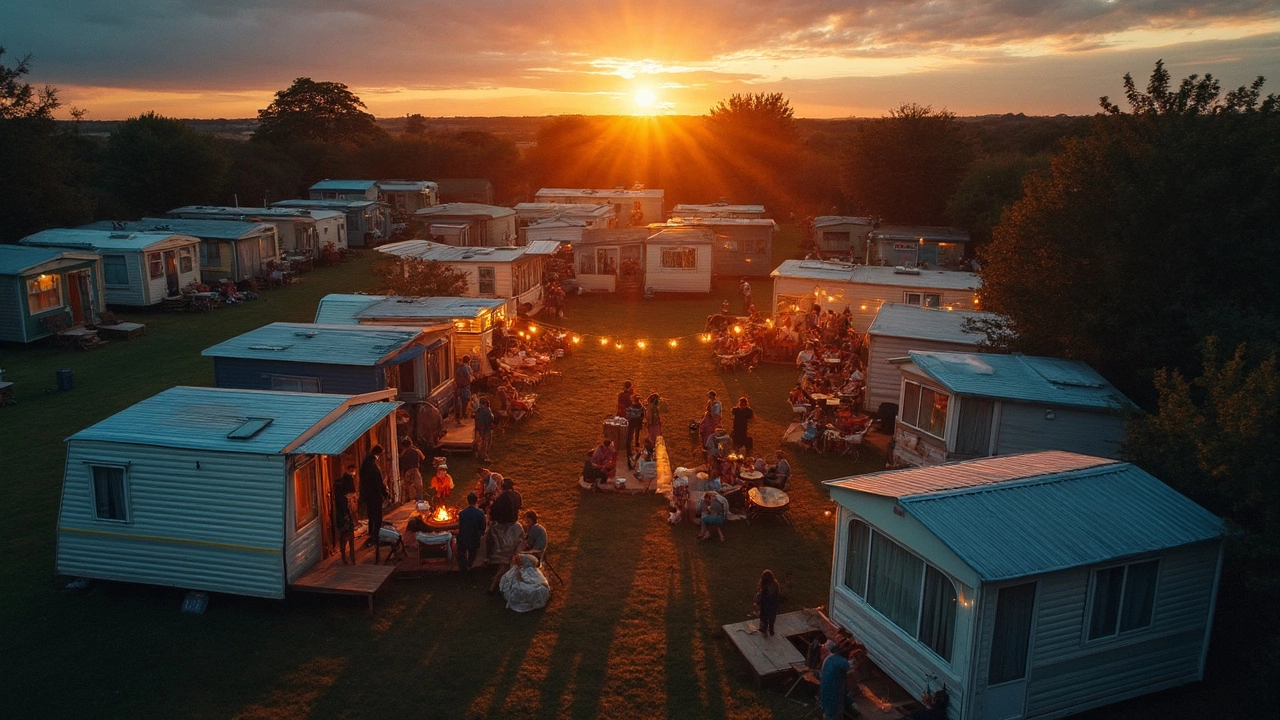
Maintenance and Wear and Tear
Living in a caravan may seem like a breezy adventure, but keeping everything in working order can be a real challenge. Caravans need lots of ongoing maintenance, and if you're not prepared, this can catch you off guard. Let's break down what you need to watch out for.
Frequent Checks and Repairs
Caravans are more like cars than houses when it comes to wear and tear. Moving parts, like doors and windows, can start misbehaving after all the mileage. You'll need a watchful eye and regular checks to keep everything shipshape.
Plumbing Problems
The biggest headaches can come from the plumbing. Water tanks need to be cleaned regularly, and pipes can easily leak or clog. Keeping them in good condition is crucial to avoid any unpleasant surprises. Regularly using tank cleaning solutions can save a lot of hassle down the track.
Electrical and Gas Systems
The electrical system should be inspected often. Wiring can get rattled loose over time, and malfunctioning appliances are a safety risk. The same goes for gas systems. Any gas smell has to be investigated immediately. Consider investing in good quality detectors for both carbon monoxide and propane.
Managing Wear and Tear
Apart from regular maintenance checks, it's smart to keep a stock of basic repair tools and parts. Things like duct tape, spare fuses, and a tool kit can be lifesavers. Joining a caravan living community or online group can also provide handy tips and support.
In some cases, having a small emergency fund set aside can help deal with unforeseen repairs without busting your budget. Constantly being on the move means your caravan will wear down quicker, so staying on top of maintenance helps avoid costly repairs in the long run. Stay proactive and keep your home on wheels rolling smoothly!
Utility and Resource Management
When living in a caravan, handling utilities and resources is a whole new ball game. Traditional homes connect to endless supplies, but in a caravan, it's about managing what's available. Let's tackle the essentials: water, gas, and electricity.
Water Usage
Most caravans have limited water tank capacity. This means being efficient with your water use becomes a must. Simple actions like shorter showers and mindful dishwashing can make a huge difference. Plus, you'll need to find places to fill up. Some caravan parks offer refill stations, but always double-check before you arrive.
Powering Up
Electricity is another resource you’ll have to juggle. Many campers rely on solar panels, but they're not a guarantee, especially on cloudy days. Car battery setups and generators are options, but they require planning and sometimes a bit of know-how to maintain. If you're parked at a site, shore power is best, providing constant access, but it often comes at a price.
Gas Supply
Gas is key for cooking and heating in a caravan lifestyle. Most folks carry portable gas bottles, but they can run out faster than you'd think. Knowing where to refill or swap bottles is crucial. Make sure to track how much you use, so you're not caught in the cold or with a half-cooked meal.
Efficiency is vital in caravan living. Here’s how to keep things running smoothly:
- Avoid using multiple electrical appliances at once to prevent tripping the system.
- Invest in energy-efficient gadgets and LED lights.
- Always have a backup plan for water and energy. Portable solutions, like collapsible water containers and power banks, can be lifesavers.
Managing these utilities and resources well can turn potential headaches into breeze-like tasks, making your caravan living experience much more enjoyable and sustainable.
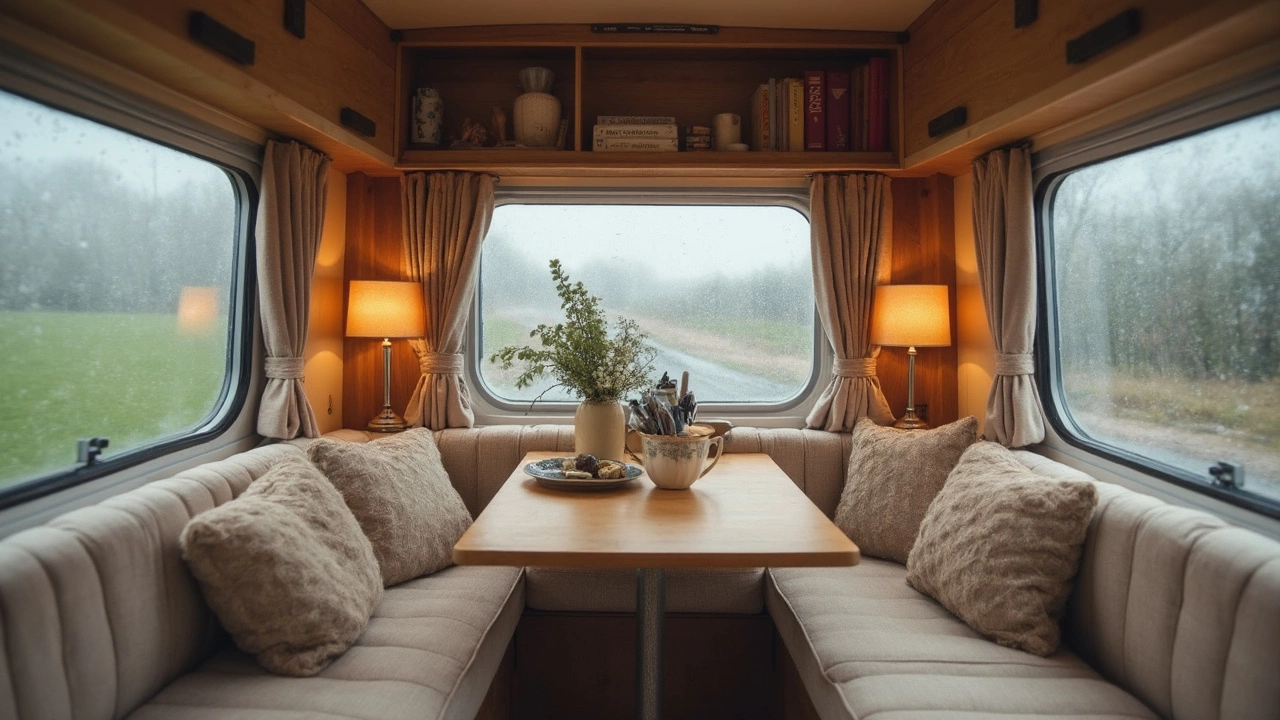
Financial Considerations
When it comes to living in a caravan, the finances can be a bit of a mixed bag. At first glance, it might look cheaper than a regular home, but dig a bit deeper, and you'll find some costs that might catch you off guard.
Upfront Costs
Starting with upfront costs, you've got the purchase price of the caravan. Depending on the size and luxury level, this could range from a few thousand to over a hundred grand for top-of-the-line models. And don't forget the costs for add-ons like solar panels or awnings, which can quickly add up.
Monthly Expenses
Next up, you'll have monthly expenses like caravan park fees. These can vary widely depending on location and amenities offered. In more popular spots, they can be just as pricey as renting an apartment. Then there's the cost of utilities; water, gas, and electricity can be more expensive because you're using them in smaller, perhaps less efficient systems.
Maintenance and Repairs
Caravans require regular maintenance to stay in tip-top shape. From fixing leaks to servicing brakes, you're looking at frequent small costs, and every now and then an unavoidable bigger ticket item. Unlike a traditional house, these repairs can be more frequent due to the mobile nature of a caravan.
Unexpected Costs
Be prepared for the odd unexpected cost too. Insurance might be another surprise—caravan insurance can be more complicated than regular home insurance, given the risk factors associated with travel and storage.
Living on the Move
If you're planning on traveling a lot, remember to factor in fuel expenses. Towing a caravan around isn't known for being fuel-efficient, so those costs can add up, especially if you're covering lots of ground.
All said and done, while caravan living can offer a cheaper lifestyle in terms of mortgage or rent, it's not without its own set of financial commitments. It's essential to plan and budget accordingly to avoid getting caught short.
